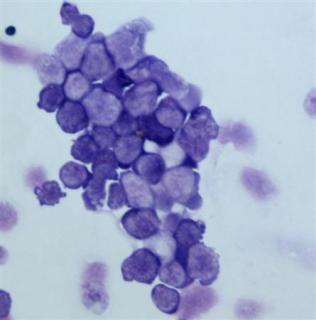
Advances in genetic profiling are paving the way for more precise, and effective, treatment of the aggressive bone marrow cancer known as acute mylogenous leukemia, or AML, according to new research.
 |
| An image of malignant blood cells in the bone marrow (termed ''leukemic blasts'') of a patient with acute myeloid leukemia is seen in this handout photo. |
Advances in genetic profiling are paving the way for more precise, and effective, treatment of the aggressive bone marrow cancer known as acute mylogenous leukemia, or AML, according to new research.
Two studies, published in the latest edition of the New England Journal of Medicine, show that genetic testing can guide doctors in how best to use current therapies as well as identify new drug targets.
"As lots of studies identify new alterations in genes in leukemia and other cancers, we need to begin to understand how these alterations in DNA can predict outcomes and determine differences in treatment," said Dr. Ross Levine of Memorial Sloan-Kettering Cancer Center in New York, the lead author of one of the studies.
Such personalized therapy is considered the new frontier for medical practice, and hopes for its success underpin a $5.7 billion hostile bid by drugmaker Roche Holding for gene sequencing company Illumina.
The second study, from Washington University in St. Louis, found that 85 percent of bone marrow cells in patients with myelodysplastic syndrome, a blood-related disorder that can precede AML, were linked to mutations in progressive cancer.
The Sloan-Kettering study analyzed bone marrow samples from 502 AML patients for mutations in 18 genes associated with the disease. The researchers were able to categorize two-thirds of the patients into groups clearly defined by their survival chances.
The study found that high-dose chemotherapy improved the rate of survival for patients with three specific genetic mutations, compared with standard-dose chemo.
It also showed that genetic profiling makes it possible to more precisely determine which patients are most likely to have their leukemia return after treatment.
AML is typically cured in about 40 percent of adults between the ages of 18 and 60, according to Levine.
"We were able to identify a very large subset of patients who need new therapies," he said. "Another set was found to do incredibly well with existing therapies, and that is very informative."
The American Cancer Society estimates that AML will be diagnosed in nearly 14,000 Americans this year and that more than 10,000 people will die from the disease.
Gene profiling for AML, and most other cancers, is not currently part of standard clinical practice.
"There are aspects of this that are ready to be adopted," Levine said, adding that the immediate hurdles are the cost of genetic testing and intellectual property rights pertaining to genes that have been patented.
And questions remain about the number of genetic mutations that AML patients should be screened for.
"It is exciting to think that the goal of personalized medicine is quickly approaching," Dr. Lucy Godley said in a NEJM editorial. "But it will require careful thought to implement genomic-based clinical evaluation in a way that is meaningful for patients."
(Source: Reuters)





